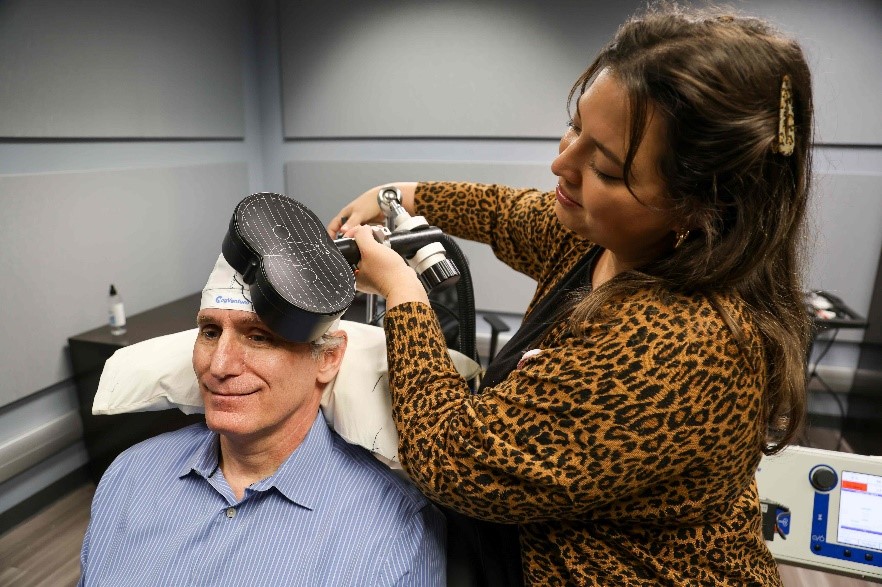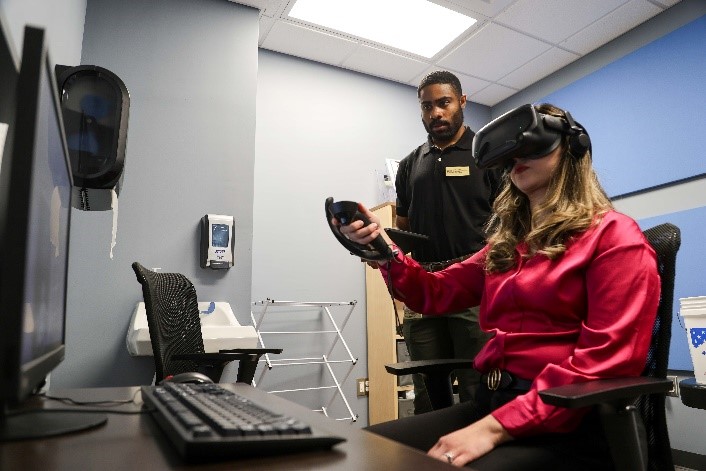
The U.S. Department of Defense awarded a four-year, $3 million grant to a Florida State University College of Medicine research team to begin a clinical trial on a potential therapy for post-traumatic stress disorder — the second DoD grant for the FSU clinical neuroscience team led by Dr. F. Andrew Kozel and co-director Kevin A. Johnson.
The therapy incorporates virtual reality into the team’s already promising work with transcranial magnetic stimulation (TMS) treatments. TMS uses magnetic fields to stimulate nerve cells in specific areas of the brain. In the new clinical trial, volunteers with PTSD will first undergo two weeks of virtual reality mindfulness training twice a day.
“If at that point their symptoms have not resolved, then they go into a protocol where they are randomized to active versus sham — or real versus fake — of accelerated TMS,” Kozel said.
Those who take part in the TMS portion of the study are randomized into three groups. Two groups will receive active TMS but on different sites of the brain, while the third will receive a sham treatment. All participants are subsequently treated with an active accelerated TMS protocol. Thus, all participants receive at least one active TMS treatment in this study.
The treatments are “accelerated” in the sense that instead of undergoing the current clinical protocol of one treatment per weekday for approximately six weeks, this new clinical trial will have volunteers come in for just five consecutive days in which they receive five treatments per day.
“Our goal is to be able to determine if accelerated TMS is an effective treatment for PTSD,” Kozel said. “This study will also give us important information as to which treatment parameter may be better and how long the effects last. That is one of the big issues with many treatments — that they may work initially but then they fade very quickly. TMS treatments for depression have traditionally been shown to have a very prolonged effect — often years at a time. This still needs to be tested for accelerated TMS to see if that is the case with PTSD.”

To monitor longevity, researchers follow up with the volunteers at one, three and six months.
According to Kozel and Johnson, PTSD can arise from any traumatic experience.
“PTSD comes in all shapes and sizes,” said Johnson, who has a doctorate in neuroscience and is also a registered nurse. “It comes from military combat, auto accidents, violent crime, domestic abuse — there are many other examples.”
Although there is a small monetary stipend for qualified volunteers who complete the trial, Johnson said that is not the main reason why people decide to participate.
“Part of it is they may feel they have no other treatment options. Not everyone is going to get better with research treatments. We’ll get a certain percentage that do, but even the ones that don’t get better know that we are learning something in the process, and they are contributing to helping the broader community,” he said. “They know how much they’ve struggled with PTSD and even if this is not the right answer for them, they know they are helping us figure out the right answer for other people.”
Individuals interested in participating in research at FSU Neuromodulation can visit the lab website med.fsu.edu/kozellab/fsu-neuromodulation to complete a confidential contact survey.



